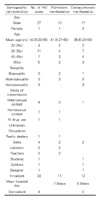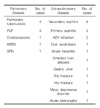Abstract
Background
In AIDS patients, the respiratory tract is one of the most frequently involved site of by an opportunistic infection, and an even common, casual pulmonary infection manifests in a peculiar ways in AIDS patients. In Korea, because of the low prevalence of AIDS, there is insufficient data compared with other Southeast Asian counties. However, considering the sexual behavior of the younger generation, it is expected that it will not be long before AIDS becomes a major public health issue in Korea. This study examined the clinical manifestation of HIV positive people and AIDS patients. The pulmonary manifestion of HIV-positive was evaluated. This study focused on the differences in the clinical manifestation between AIDS patients with pulmonary disease and simple HIV positive people. The characteristics of common pulmonary infections in AIDS patients were also analyzed.
Method
The medical records of 28 HIV positive patients who visited the hospital of ChungAng University Hospital from January, 2001 to February, 2006 were analyzed retrospectively.
Result
Twenty-seven patients out of 28 HIV positive patients were male and the average age was 40.6(23-65). Patients in their thirties were most commonly affected. Elven patients had pulmonary diseases. Pulmonary tuberculosis (4 cases) and pneumocystis pneumonia (4 cases) were the most common respiratory infection. One patient showed a peculiar type of systemic cryptococcus. which was accompanied by lung and pleural dissemination. The CD4+lymphocyte count of patients with a pulmonary infection was significantly lower in patients with a pulmonary manifestation than those with only a HIV infection (79.5/mm3 vs 400/mm3, respectively)(p<.05). Patients with pulmonary disease were in a more severe immunosuppressive state. There were 4 patients with pulmonary tuberculosis, 4 with pneumocystis pneumonia, 4 with secondary syphilis, 2 with primary syphilis, and 2 with HZV infection. The average CD4 lymphocyte counts was 56/mm3 in those with pulmonary tuberculosis, 42/mm3 in those with pneumocystis pneumonia, and 455/mm3 in those with secondary syphilis.
Conclusion
This study examined the clinical manifestation of HIV positive patients, particularly AIDS patients with pulmonary disease, A more severe immunosuppressive status was observed in HIV-related pulmonary compared with those with HIV-related extrapulmonary disease, and the frequency of pulmonary tuberculosis in pulmonary disease was higher than expected. Respiratory infection in AIDS manifest in uncommon ways e.g. disseminated cryptococcosis involving the lung and pleura. Evidently, AIDS patients with a respiratory infection have a more severe form of immunosuppression than those with a simple HIV infection. As expected, patients with a pulmonary infection were in a more severe immunosuppressed state than those with a simple HIV infection. Opportunistic infections can show peculiar clinical presentations in AIDS patients.
Figures and Tables
 | Figure 1Disseminated cryptococcosis with pleural infection in an AIDS patient. In the pleural fluid, Cryptococcus neoformans was cultured. |
References
1. UNAIDS/WHO. Report on the global HIV/AIDS epidermic. 2000.
2. UNAIDS/WHO. AIDS epidermic update. 2005.
3. Choi HJ, Kim JH, Whang SC, Chun GW, Lee JS, Kang JS, et al. A case of acquired immunodeficiency syndrome. Korean J Med. 1988. 35:265–272.
4. Oh MD, Park SW, Kim HB, Kim US, Kim NJ, Choi HJ, et al. Spectrum of opportunistic infections and malignancies in patients with HIV infection in South Korea. Clin Infect Dis. 1999. 29:1524–1528.
5. KCDC. 2006 HIV/AIDS guideline. 2006.
6. Lee SY, Oh YW, Kim HK, Shin BK, Park SM, Lee SH, et al. A case of nonspecific interstitial pneumonitis mimicking pneumocystis carinii pneumonia in HIV-positive patient. Tuberc Respir Dis. 1999. 47:843–849.
7. Mocroft A, Ledergerber B, Katlama C, Kirk O, Reiss P, d'Arminio Monforte A, et al. Decline in the AIDS and death rates in the EuroSIDA study: an observational study. Lancet. 2003. 362:22–29.
8. CDC. U.S. HIV and AIDS cases reported through June 2000: HIV/AIDS surveillance report. 2000. 12:1–44.
9. UNAIDS/WHO. AIDS epidermic update. 2000.
10. Choi BS, Koo BK, Kim SS, Suh SD, Seong BM, Lee JS, et al. Immunologic characterization of newly found Koreans as HIV seropositives by the year. Korean J Infect Dis. 2000. 32:115–122.
11. Woo JH, Jang JM. The epidermiological characteristics of Korean people with HIV/AIDS. Korean J Med. 2001. 61:347–349.
12. Kaplan JE, Hanson D, Dwaorkin MS, Frederick T, Bertolli J, Lindegren ML, et al. Epidermiology of human immunodeficiency virus associated opprtunistic infection in the United States in the era of highly active antiretroviral therapy. Clin Infect Dis. 2000. 30:S5–S14.
13. Choi JW, Oh MD, Park SW, Kim HB, Kim ES, Kang SW, et al. Opportunistic infection and malignancies in 173 patients with HIV infection. Korean J Infect Dis. 1998. 30:507–515.
14. Kim JM, Cho GJ, Hong SK, Chung JS, Jang KH, Kim CO, et al. Epidemiologic and clinical feature of HIV infection/AIDS in Korea. Korean J Med. 2001. 61:355–364.
15. Batungwanayo J, Taelman H, Lucas , Bongaerts J, Alard D, Kagame A, et al. Pulmonary disease associated with the human immunodeficiency virus in Kigali, Rwanda: a fibroscopic bronchoscopic study 111 cases of undetermined etiology. Am J Respir Crit Care Med. 1994. 149:1591–1596.
16. Shim TS, Koh WJ, Yim JJ, Lew WJ. Diagnosis and treatment of latent tuberculosis infection in Korea. Tuberc Respir Dis. 2004. 57:101–108.
17. Meduri GU, Stein DS. Pulmonary manifestation of acquired immunodeficiency syndrome. Clin Infect Dis. 1992. 14:98–113.
18. Hill AR, Premkumar S, Brundtein S, Vadiya K, Powell S, Li PW, et al. Disseminated tuberculosis in the acquired immunodeficiency syndrome era. Am Rev Respir Dis. 1991. 144:1164–1170.
19. Goletti D, Weissman D, Jackson RW, Graham NM, Vlahav D, Klein RS, et al. Effect of Mycobacterium tuberculosis on HIV replication: role of immune activation. J Immunol. 1996. 157:1271–1278.
20. Masur H. Prevention and treatment of pneumocystis pneumonia. N Engl J Med. 1992. 327:1853–1860.




 PDF
PDF ePub
ePub Citation
Citation Print
Print






 XML Download
XML Download